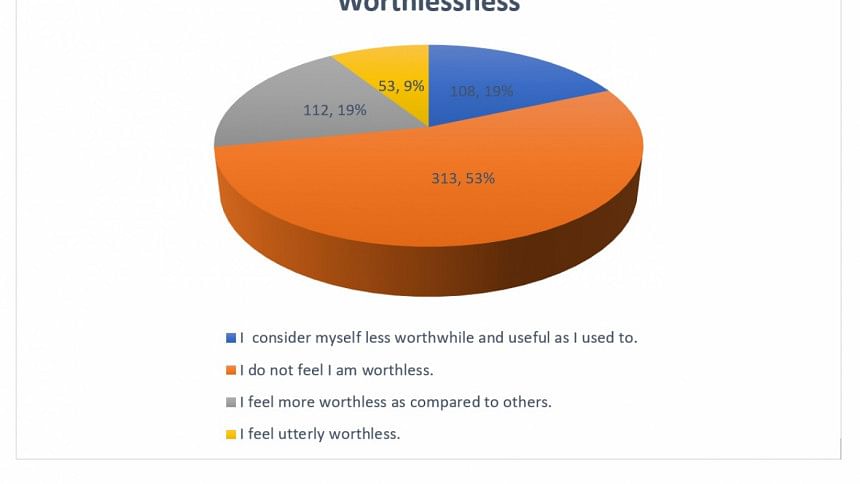University students’ struggle with concentration and self-worth

Ask a student, "How are your studies going?" Don't be surprised if they say one of two things, or both in reply: a) they are finding it difficult to concentrate; and b) they are struggling with a feeling of worthlessness. The two phenomena are intertwined with mental health. Ideally, a university student's responsibility is to study and excel in academics. This gets difficult if they find it hard to concentrate. Being unable to concentrate leads to less-than-optimal academic performance, which then leads one to question one's self-worth.
It goes both ways: one feeds off the other in a series of escalating steps. The result is stress, anxiety, and even depression. Academic administrators are blissfully unaware of this, nor do they seem to care that a large number of university students are suffering from mental health issues. A student struggling with the feeling of worthlessness will find it hard to summon the willpower needed to focus on their studies. This difficulty can be crippling because of the other struggles in their daily lives; when things become near impossible, some fall into depression and go over the edge.
Our recent survey explores the barely traversed topic of depression among university students in Bangladesh. Research on this topic is vital to eliminate the myths, fabrications, and guesswork around this subject. Among other metrics, we explore concentration difficulties and feelings of worthlessness that students frequently experience.
On concentration difficulty, 33 percent of the respondents had none. But an overwhelming majority (67 percent) reported facing some form of concentration difficulty (see Figure 1). More than 10 percent cannot seem to concentrate on anything at all, and the rest either find it difficult to keep their minds on anything for long, or are unable to concentrate as well as usual. Extrapolating these numbers across university-going students reflects a serious and disturbing situation.

On the question of worthlessness, 313 indicated not feeling worthless. What is disconcerting is that almost half of our university students feel some sense of worthlessness. Some of them feel worthless in comparison to others, some vis-à-vis their past selves, and almost 10 percent felt "completely worthless." Is this acceptable? Figure 2 shows the distribution of responses in each of the categories.

It's worse still that a large proportion of the students feel completely worthless. If these proportions are projected for all the university-going students in Bangladesh, there are deep-rooted problems that cannot be left unaddressed.
We hope the university governing bodies across the country are taking a note. Boasting about how much they value their students (perhaps their pockets only) is one thing; backing up the claims is what the stakeholders ought to demand. Academic fulfilment requires serious attention to students' mental health. Students who are finding it difficult to concentrate and questioning their self-worth might take heart from the fact that others have been there and pulled out.
Here are some things students must keep in mind to bring balance to their lives:
Get professional help: Getting clinically diagnosed and accepting medical treatment can save lives. Our nagging question is whether such "professional" help is available for the mental challenges students experience so widely.
Slowly, but surely: One cannot expect to heal overnight, just like any physical illness.
Good companionship: It is important to be with people who provide genuine love and care – those who want what is best for the suffering individual. Oftentimes, young people ignore those who have their best interests at heart, seeking the ephemeral approval of those who do not really care.
Physical fitness: The mind and the body are connected; neglecting one's physical well-being may adversely affect one's mental health. It is important to take up a sport, start physical exercise, or even try the martial arts.
Philanthropy: It is important to help others without publicising it and without asking for anything in return. With positive impact, it can do wonders to one's self-worth.
The list is not comprehensive, but something to begin with and incorporate into one's life. If academic institutions really care, they will endeavour to provide support in these areas for all students to preserve good mental health.
It is also important to conduct more studies regularly to track students' mental health status. At the same time, the stigma surrounding mental health challenges needs to be brought out in the open and discussed widely to normalise a condition that exists in all societies. In academia, administrators are urged to develop a keen eye on students' mental health challenges and extend a warm and reassuring hand to those in need of counselling. Their challenge is to nurture students holistically, not just academically.
This op-ed, the second of a four-part series, is the result of faculty-student collaboration designed to impact higher education in Bangladesh.
Dr Syed Saad Andaleeb is distinguished professor emeritus at Pennsylvania State University in the US, former faculty member of the IBA, Dhaka University, and former vice-chancellor of Brac University.
Irfan Ahnaf completed his MBA from the IBA, Dhaka University.

 For all latest news, follow The Daily Star's Google News channel.
For all latest news, follow The Daily Star's Google News channel. 





Comments